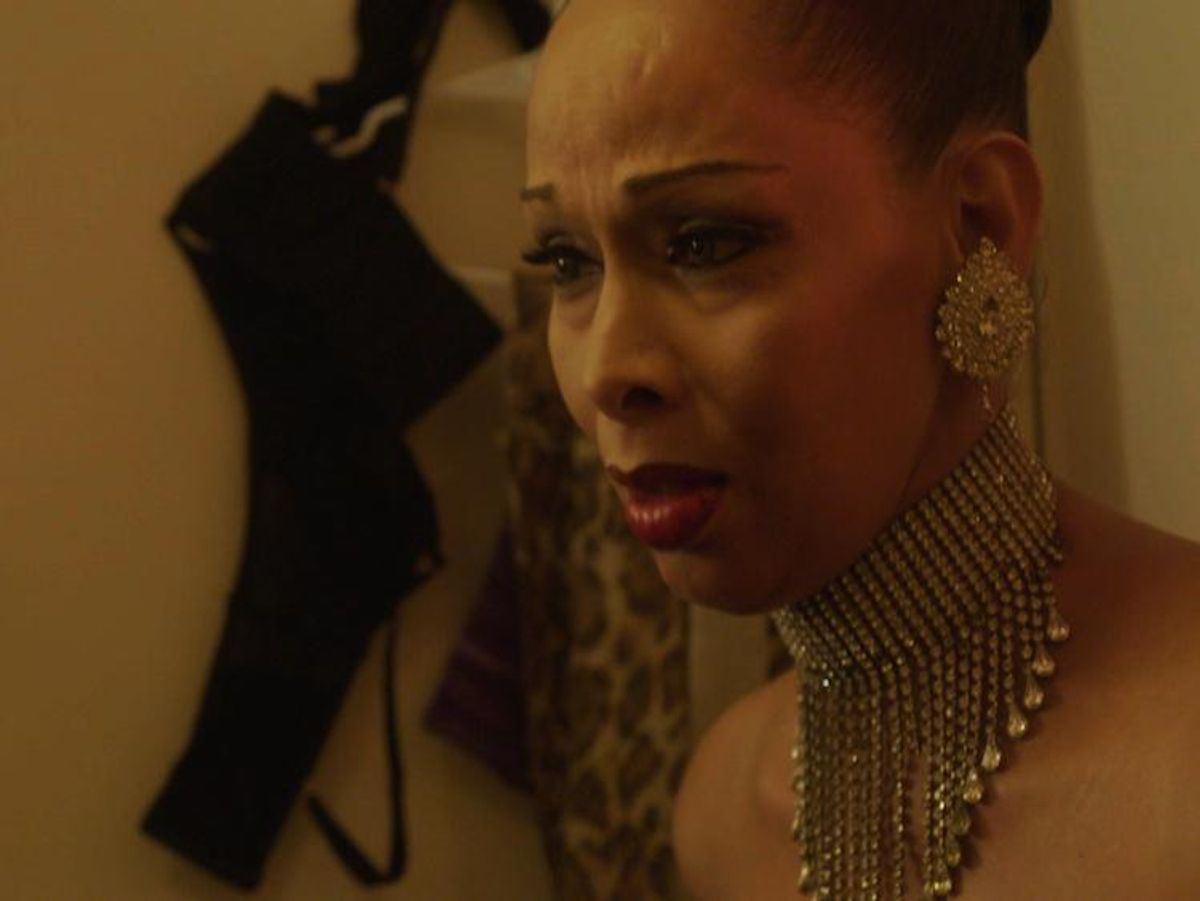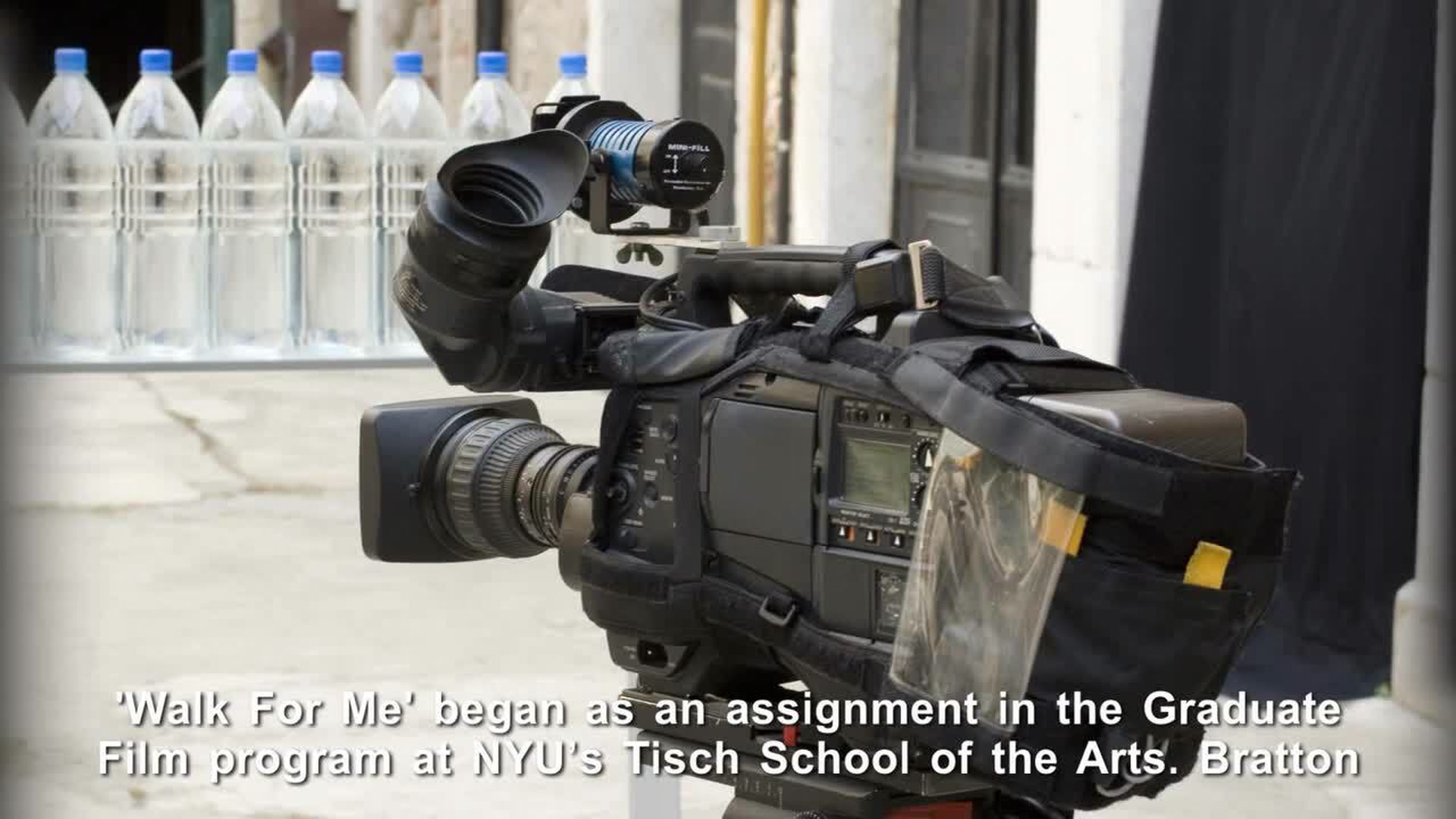Elegance Bratton is on his way. The filmmaker is en route with Chester Algernal Gordon, the art director of his latest short film Walk For Me, which plays at Outfest in Los Angeles this Friday. We are set to meet with Brenda Holder, one of the film's stars, at her apartment in Crown Heights, Brooklyn. When they arrive, we all go up to Holder's spacious walk-up together. They have a familial chemistry with the star, and I ask them how they first met. Holder, also known as Paris Continental, says, "They've been following me, because I'm an icon in the ballroom scene." She gestures to her prize-lined mantle. "I'm a pageant girl. I'm the first trans Miss Black New York."
Walk For Mebegan as an assignment Bratton did in his second year in the Graduate Film program at NYU's Tisch School of the Arts. Bratton wanted to show the world a story about black trans women that didn't hinge on their pain, because "we weren't getting narratives of these women as mothers. We were getting narratives of these women as being prime targets, but we're not getting really a sense of what the community loses when they're taken from us. Within the black community, we have yet to have a deep, nuanced conversation about gender identity, and particularly the difference between gender identity and sexuality."

The film is partially a study of motherhood, as Holder's character plays a maternal role to Aaliyah King's angsty, adroit Hanna. Holder tells me she is no stranger to this type of role in her personal life, nor to being a film star (she was featured in the documentariesParis Is Burning and Mirror, Mirror). Her stage name is partially an homage to her own "gay mother" Paris Dupree. She chose her surname, Continental, because she's "an all around the world kind of girl."
Holder met Dupree, house mother of The Legendary House of Dupree, at the turn of the '80s, and started performing in ballrooms. Holder faced youth homelessness and flocked to Christopher Street. These years were spent "working, doing shows, turning dates to survive." Several years into performing, Holder followed her older brother's suggestion that she test into the Army, and Dupree's advice that serving might save her life. "I didn't want to go, when it came time," she remembers. She hands me a stack of photos, including one of her in uniform. She ended up serving from 1984 through 1988.
"We have that in common," Bratton chimes in. He recalls a phone call with his mother from a youth homeless shelter he was living in, during which he asked if he could return home. She asked if he was "still gay," and when he said yes, she suggested he join the military instead. Incidentally, Bratton then got his start behind the camera as a combat filmmaker in the Marines. "The first time I ever held a camera, the first time I'd ever been called a director, the first time I ever pressed record, was as a Marine," he remembers.

Walk For Me often seems like it could be set in the ballroom scene of Holder's Paris Is Burning days, if it weren't for certain timestamps, including a bedroom shrine to modern pop culture icons, such as Nicki Minaj. Because of this, it functions as a conversation about how infiltrative the ballroom scene has been in the mainstream since then, particularly after so many notable cultural producers have tilled communities into commodities. Or in Holder's words, "Everyone steals from ballroom."
The images of Minaj, part of art director Chester Algernal Gordon's deliberate mise en scene, strike a particular nerve. Bratton shares, "A personal opinion of mine is that so much of popular culture is really queer. Men fantasize about Nicki Minaj [and] Beyonce. From behind, I know 30 girls who have that shape. They aren't born as girls. Yet once they turn around, it's a problem. Now you want to bash someone's head in. When Nicki Minaj has that body, it's okay. The thing that has become the creme de la creme is actually a femme queen body."
This iceberg tip of a conversation is but one reason Bratton wants to sprawl these packed ideas across a feature film. There's a lot of work to be done here, and some of it he sees as a corrective. "I want to make an incredible feature film that's 99.9 percent trans people of color, 100 percent ballroom," he says. "I want to apply these skill-sets that I've picked up at the best film school in the world, use the best cameras. I saw Tangerine[and] I like Sean Baker a lot, but when I saw the press for that film and how people were patting him on the back for using a cellphone to make this movie, I'm thinking to myself, 'what you are saying is that the people he's filming are only worth cellphones.'"
Bratton, above all, wants other filmmakers to notice Holder. "For your first film, you don't really need to have stars, but you're lucky if you can get a star. That's the thing about the ballroom scene, is that this is Hollywood. I hope that directors out there who get a chance to see Brenda in it, hire her to act in other things. I'm the luckiest writer/director in New York City, because I've found this incredible, deep talent."
Watch Walk For Me at Outfest Los Angeles this Friday.





















































































